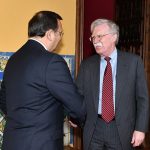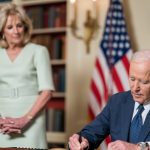Donald Trump, in a stark contrast to the current occupant of the Oval Office, demonstrates that engaging with the media doesn’t require a teleprompter. During his recent media interaction, Trump combed through layers of political nonsense, doing something rare in today’s political landscape: actually addressing the questions that matter. A recent inquiry about the revocation of John Bolton’s security clearance provided an opportunity to shed light on why keeping certain individuals in positions of power, even post-employment, is a recipe for disaster.
The media’s insistence on prodding Trump about Bolton’s security clearance reeks of desperation. The answer is as clear as day to anyone paying attention. Trump’s Inauguration Day executive order sent a firm message regarding the roles of former officials. It underscores an essential principle—that classified information should not be adulterated for personal gain. Bolton, having penned his tell-all memoir filled with sensitive information that he churned out for profit, exemplifies a misuse of power that should not be tolerated.
Reporter Asks Trump Why He Revoked Bolton’s Security Clearance. The Answer Is FIRE. https://t.co/dBjBe9FFmG
— Andrew Bostom, MD, MS (@andrewbostom) January 23, 2025
In responding to the question, Trump took a straightforward approach, probing the ridiculous notion that former officials should hold onto security clearances indefinitely. His point was simple: once someone leaves their role, they should also leave behind the privilege of access to classified information. The very idea that former officials could exploit confidential intelligence for self-serving agendas is alarming, yet it seems some in the intelligence community have embraced this reckless path—remember the 51 “intelligence professionals” who labeled Hunter Biden’s laptop a Russian hoax?
Moreover, Trump made noteworthy observations about Bolton himself. Describing him as someone who instigated conflicts yet had his own shortcomings, Trump painted a vivid picture. The former president vividly highlighted the misguided decisions that led the U.S. into wars that ultimately created a power vacuum, allowing far worse regimes to flourish. The destructive legacy of the Bush administration looms large, and Trump’s insistence on accountability reflects a broader rejection of endless warfare that achieves little but devastation.
The mess left in the wake of these conflicts invites scrutiny. The removal of Saddam Hussein might have seemed reasonable, but it unleashed chaos that empowered Iran and bred radicalism in the region. Trump’s position starkly contrasts with the beltway establishment; he recognizes where the U.S. blundered in foreign policy and has made it clear that a reevaluation is not only overdue but absolutely necessary.
In essence, Trump is not only advocating for the America First approach; he is making strides to dismantle the complacency that has allowed ineffective leaders like Bolton to exert influence beyond their tenure. With Trump back in the driver’s seat, one can only hope that the influence of outdated ideas fades as new, pragmatic approaches to governance and foreign relations are put into play. After all, it’s high time the country refocused on restoring its sovereignty and common sense in leadership—something long overdue in Washington.




